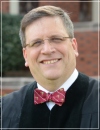 While I do not hold to pre-millennialism (as stated below) this is an excellent article by Pastor Anthony Wood of Mission Bible Church, Tustin, California, regarding doctrinal unity (original source here).
While I do not hold to pre-millennialism (as stated below) this is an excellent article by Pastor Anthony Wood of Mission Bible Church, Tustin, California, regarding doctrinal unity (original source here).
Evangelicals Can Have Doctrinal Discussion in a God Honoring Way
“We must know when to wield the sword mightily and when to keep it sheathed!” prince of preachers Charles Spurgeon once exclaimed.
On Twitter we find two types of evangelical Christian… One group steers clear of any biblical truth that may challenge or offend. The second type tends to live in a polemic bubble of red cap and exclamation mark. One day we’ll die on the hill. The next day we post jelly memes and dandelion post cards. This is true of us pastors too. At times we may even live in one camp for a day and then cross over. However, there are some prudent things we can do to prevent from virtualized doctrinal schizophrenia.
First, we shouldn’t be so hard on the concept of multiple denominations. One sad hallmark of modern evangelicalism is the tendency to get frustrated by the idea of denominations. Many who are new to the faith ponder why there are so many different versions of Christianity. However, what they miss is that denominationalism, although not perfect, is better than what existed before it! Up until the reformation, Christians had no choice but to participate in the papal system of Roman Catholicism. If they refused, they could be killed as dissenters.
Even the Anglican Church attempted to force conformity up until the 1680’s when the birth of pilgrims in a new nation (America) provided the right to disagree and depart based on matters of faith. As early as the Westminster Assembly (1642-1649) independents were pushing “congregational” principles, including the following statements:
1) Due to man’s inability to fully comprehend truth, differences about the outward form of church are inevitable.
2) Differences may not involve fundamentals of the faith but they are important and a Christian is obligated to practice what he believes the Bible teaches.
3) Because no church has a final and full grasp on divine truth, the true Church of Christ can never be fully represented by one single ecclesiastical structure.
4) Separation does not itself constitute schism, it’s possible to divide at many points and still be Christian.
We take these items for granted but they were world-changing in 1640. Historian Bruce Shelley summarizes the role America played in denominationalism:
“The religious diversity of the American colonies called for a new understanding of the church. We may call it the denominational theory of the church. Denominationalism, as originally designed, is the opposite of sectarianism. A sect claims the authority of Christ for itself alone. It believes that it is the true body of Christ; all truth belongs to it and no other religion. So by definition a sect is exclusive. The word denomination by contrast was an inclusive term. It implied that the Christian group called or denominated by a particular name was but one member of a larger group – the church – to which all denominations belong. The denominational theory of the church, then, insists that the true church cannot be identified with any single ecclesiastical structure. No denomination claims to represent the whole church of Christ. Each simply constitutes a different form – in worship and organization – of the larger life of the church.”[1]
One of the powerful opportunities both the reformation and pilgrimage to America gave Christianity was freedom to have true scholarly discussion about the Bible without risking life and limb! And, this should convict us… Instead of taking our freedoms for granted we must take full advantage, properly defining what we believe and how we will practice it. And, we must be prepared to sit and discuss what we’ve learned with our neighbors in Christ, regardless of what church they have attended previous. Continue reading

